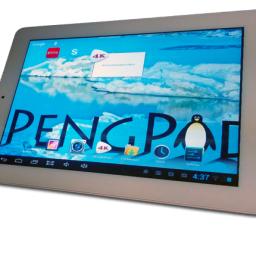What's next for tablets running Linux?
 Put aside the "Android is based on Linux" argument for a second, and let's look at the state of tablet hardware running the Linux operating system instead of Android. And it doesn't look good.
Put aside the "Android is based on Linux" argument for a second, and let's look at the state of tablet hardware running the Linux operating system instead of Android. And it doesn't look good.Network World reports Ubuntu Touch might be our last and best hope for tablets running Linux:
Canonical says that they expect Ubuntu Touch-powered tablets to start shipping in the second half of this year. When I took Ubuntu Touch for a spin on my Nexus 7 last October, it definitely had promise (if it was a bit on the buggy side). And it has certainly improved a great deal since then. Unfortunately, the ability to run traditional Linux desktop software isn't the focus of Ubuntu Touch. In theory, this will be possible, but I've yet to see this actually happen. So I'm not holding my breath.Not too long ago, Aaron Seigo and a group of KDE hackers was making a big splash about the upcoming Vivaldi tablet, which was to be a Linux tablet running a customized version of the KDE Plasma environment (KDE4 reconfigured in ways that make sense for a tablet). I was looking forward to that device, as KDE4 was rejiggered specifically to permit this kind of innovation in interfaces and avoid the whole "if Gnome3 is good enough for a tablet it's good enough for your desktop" attitude. Unfortunately, when the Vivaldi tablet project met with a lack of supporters willing to put up cold hard cash, it bit the dust:
Announcing the 'wrap up' in an e-mail sent to backers of the Improv ARM-based development board the team suggests that the FOSS community is 'not ready' to put its weight behind the 'pressing issue of hardware freedom', adding: "We greatly appreciate everyone's support, whether it was purchases, donations or words of wisdom and encouragement. There was simply not enough support to make the project work, despite having fully functional, production ready devices and a strong commitment to succeed."Well, there's still the Pengpod, currently in crowd funding. But it's barely there as a product, reliant on going from crowd-funding to crowd-funding to push out new versions of their interesting product. What is there to do if you want Linux apps on tablet hardware? For the moment, it seems the answer is "be patient."
It can still come with Android, it just needs to have documentation so a non-proprietary Linux kernel can be bootstrapped, and drivers for video/wifi/etc. can be written.
Nothing about Android forces OEMs to be "open", they're allowed to keep the specs secret, and depending on binary-blob drivers, but as long as there are manufacturers of open hardware, the community can unite behind their devices as a platform, and provide Linux and perhaps other OSes for it.
The Nexus 7 absolutely already exists, and it is a nice place to start...